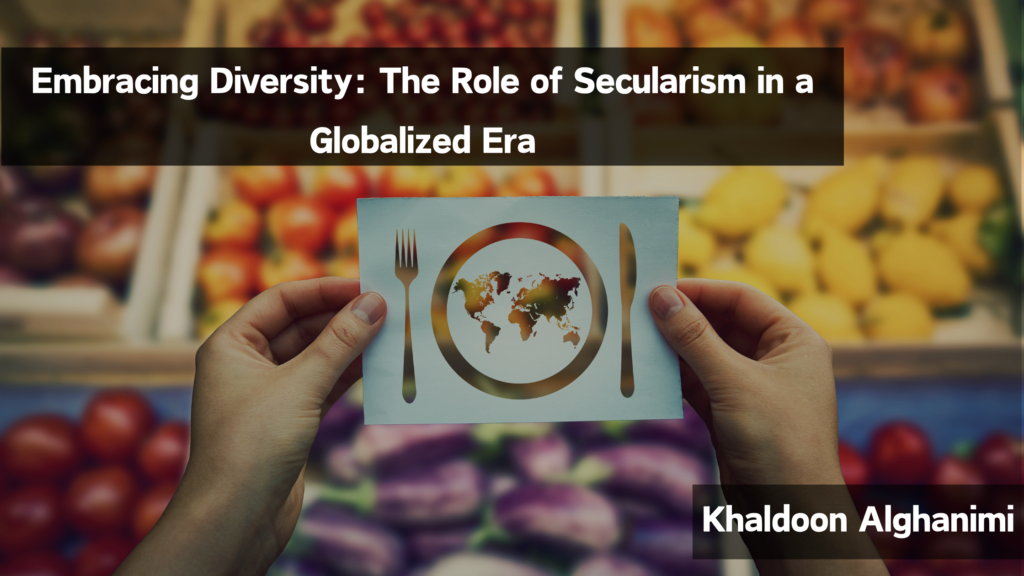Secularism, in its essence, emerges as a force that defies the confines of geography and geopolitical boundaries. It is a philosophical stance that rises above the mundane divisions of nations and states, seeking to navigate the intricate tapestry of human existence under the guise of various epithets, notably “Globalization” or the more nuanced “Planetaryism.” The relentless march of economic globalization and the relentless stride of technological progress, entwined with the convoluted narratives of fundamentalist ideologies, particularly those stemming from the Islamic tradition, have seduced certain minds into believing that these phenomena alone suffice as catalysts for the construction of a shared global arena. This envisaged domain, they propose, would not only render national values obsolete but also herald the dawn of a new era, one characterized by the emergence of the “global citizen.”
As elucidated by Dr. Murad Wahba, the contours of human perception have undergone a profound metamorphosis, veering away from erstwhile paradigms. Where once our gaze fixated upon the cosmos from the vantage point of Earth, there has been a seismic shift in perspective. Now, we find ourselves peering back at our terrestrial abode from the boundless expanse of the universe. This inversion of outlook heralds a momentous reorientation, inviting introspection into our place within the cosmic tapestry and prompting a reevaluation of our relationship with the cosmos.
The cultural and intellectual homogenization arising from this perspective dismantles the intrinsic value of nuanced diversity championed by secularism. Idealistic philosophical doctrines, intertwined with religious mythologies, adhere staunchly to a framework of sweeping generalizations and unyielding absolutism. Devoid of contextual relativity and analytical discernment, these doctrines conspicuously eschew the virtues of dialectical engagement and robust debate. Instead, they propagate a monolithic narrative that stifles dissent and suppresses dissenting voices, thereby obliterating the very essence of intellectual discourse and philosophical inquiry.
The quandary confronting proponents of the global paradigm lies in its detachment from its economic underpinnings and its extrapolation into the realms of ideology and culture. Advocates clamor for the establishment of a uniform cultural milieu that obliterates the distinctions between individuals of diverse origins – be they Chinese, Japanese, Egyptian, Iraqi, American, or otherwise. This fervent plea for homogeneity overlooks the rich tapestry of human experience and negates the intrinsic value of cultural diversity, relegating it to the annals of historical oblivion.
This rallying cry for the creation of an ideal global citizen resonates eerily with the fervent calls of religions to disseminate their beliefs worldwide. But what truly distinguishes them? The divergence lies not only in the outward appearance of the global individual, divergent from their devout counterparts, but also in the fervor with which they both strive to propagate their ideologies. While one may don the cloak of globalization and espouse a veneer of modernity, the underlying drive remains akin to the religious zealot’s mission: the erasure of diversity in favor of a singular, homogenized worldview.
Secularism, with its intricate spectrum of beliefs and principles, inherently recognizes the significance of national identities as anchors of cultural heritage and historical legacy. It operates on the premise of coexistence, emphasizing the importance of respecting and preserving the diverse fabric of human societies. However, the proponents of globalization, in their pursuit of a homogenized global culture, often overlook the nuanced intricacies and unique characteristics that distinguish one nation from another.
The danger lies in the erosion of national values and traditions, as well as the dilution of cultural identities under the banner of a universalized worldview. While globalists may not explicitly advocate for the abolition of national identities, their vision of a borderless, interconnected world risks diminishing the cultural richness and historical depth that have shaped civilizations over centuries.
When prioritizing a uniform global identity over the richness of individual cultures, there is a risk of undermining the inherent diversity that contributes to the tapestry of humanity. Secularism, on the other hand, celebrates this diversity and recognizes the value of preserving cultural heritage within the framework of mutual respect and understanding.
Embracing diversity and fostering mutual respect, coupled with unrestricted economic interaction, represents a departure from the notion of imposing a singular ideology on all. Economic openness serves as an opportunity to leverage national resources and effectively promote them on a global scale.
This model of economic engagement transcends borders and fosters interdependence, allowing each nation to capitalize on its unique strengths and resources while contributing to the global marketplace. It underscores the importance of collaboration and exchange, promoting mutual prosperity while preserving the distinctiveness of each cultural identity.



